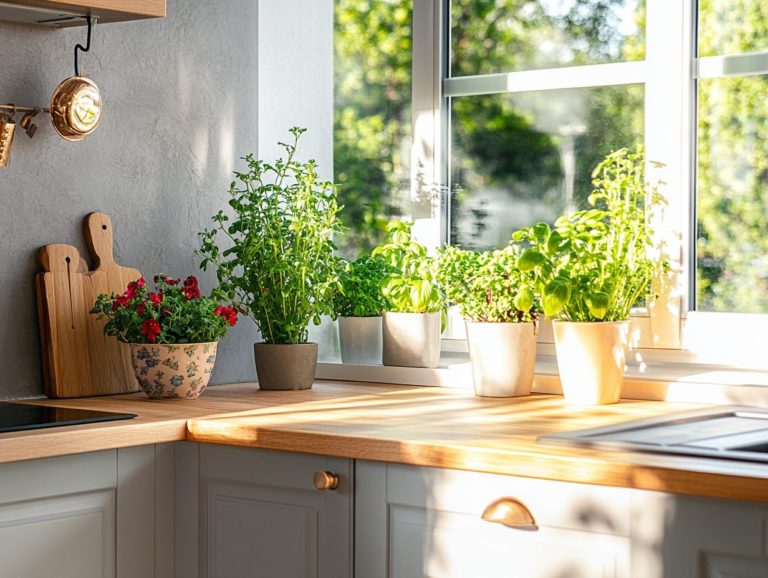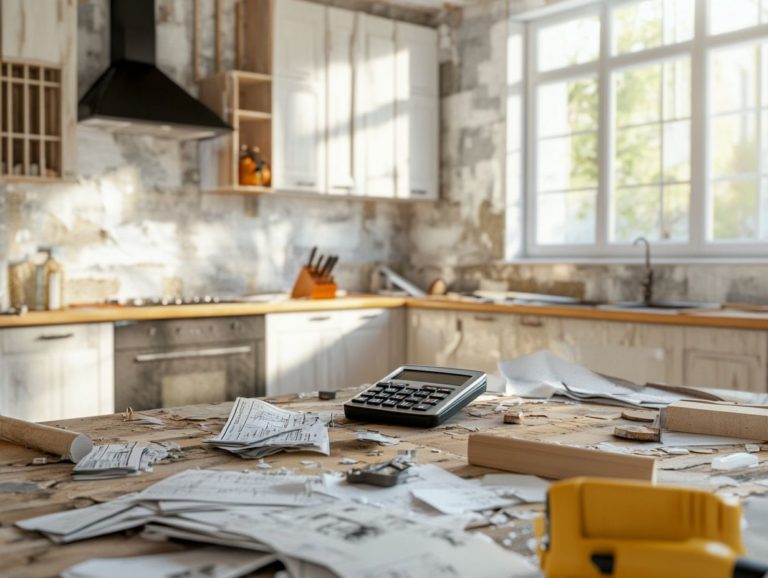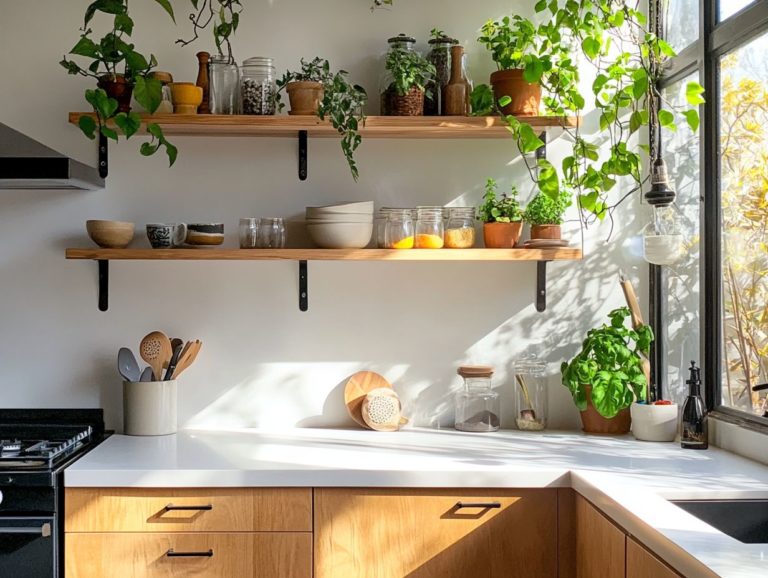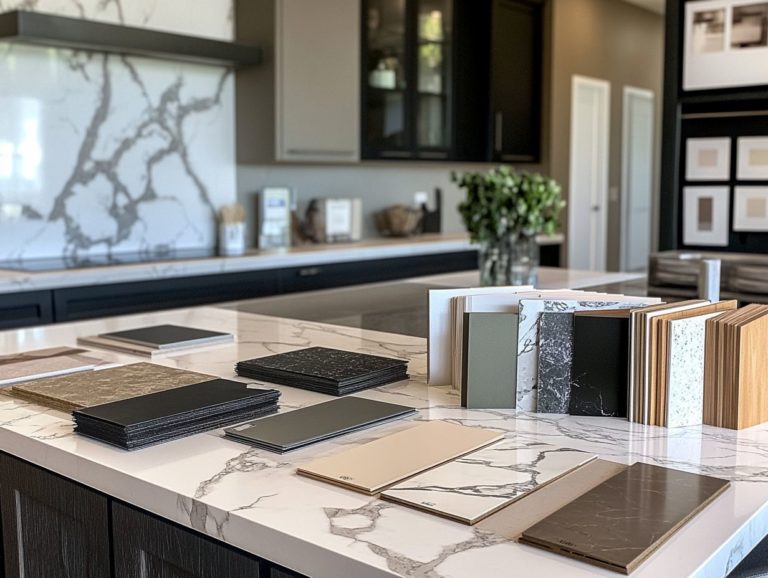Planning Your Kitchen Remodel: Budgeting Steps
A kitchen remodel can transform your space. It also enhances your cooking and entertaining experiences.
Without a clear budget, your dream project could easily become a money problem. This guide will walk you through essential steps to create a realistic budget for your kitchen renovation.
You’ll explore factors that influence costs. Weigh the benefits of DIY options against hiring professionals.
With the right tools, you can plan wisely and keep your finances on track!
Stay focused! Your dream kitchen is within reach!
Contents
- Key Takeaways:
- Setting a Budget for Your Kitchen Remodel
- Researching Costs and Estimating Expenses
- Creating a Realistic Budget
- Working with a Contractor
- DIY vs Hiring Professionals: Cost Comparison
- Sticking to Your Budget
- Frequently Asked Questions
- What should be my first step when planning a kitchen remodel?
- How do I determine my budget for a kitchen remodel?
- Are there any hidden costs I should consider when budgeting for a kitchen remodel?
- How can I save money while planning my kitchen remodel?
- Should I include a contingency budget in my kitchen remodel plan?
- What if I go over my budget during the kitchen remodel process?
Key Takeaways:

Consider all factors when setting a budget, including materials, labor, and unexpected costs.
Research costs and break down expenses to create a realistic budget.
Prioritize and make trade-offs to stay within your budget.
Negotiate with contractors to manage costs effectively.
Weigh the pros and cons of DIY versus hiring professionals.
Use tips to stick to your budget throughout the remodel process.
Setting a Budget for Your Kitchen Remodel
Setting a budget is crucial for your kitchen remodel. It shapes your design choices and keeps your project on track.
Thoughtful planning aligns your expectations with the financial realities of kitchen remodeling. This ensures that your material choices are both appealing and practical.
A structured budget enhances your decision-making. This leads to a successful kitchen transformation focused on both functionality and style.
Factors to Consider
When setting your budget, consider key factors for a smooth renovation experience.
Think about the design, quality of appliances, materials for countertops, and storage needs. Each element affects your costs and should fit your vision for the space.
The layout is essential, as it affects how well your kitchen meets your daily needs. For example, an open-plan design may require costly structural adjustments.
Choosing high-end materials like quartz or granite will impact your budget. Choosing energy-efficient appliances may also raise initial costs but can save you money in the long run.
Finding a balance between functionality and aesthetics will help you set a budget that meets practical needs while keeping style in mind.
Researching Costs and Estimating Expenses
Researching costs and estimating expenses is vital for your kitchen remodel journey.
This process involves gathering accurate information about materials, appliances, and labor costs. Prices can vary widely based on your contractor and materials.
Exploring market prices for cabinetry, countertops, and flooring helps you make informed choices that fit your budget and renovation dreams.
Breaking Down the Costs
Breaking down costs is crucial for budgeting. Consider components like:
- Appliances
- Cabinetry
- Countertops
- Flooring
- Lighting fixtures
Each of these contributes to the total expense of your kitchen renovation.
By itemizing these elements and understanding their individual costs, you’ll easily find areas to save or determine where to invest a bit more for the perfect outcome.
For example, appliances range from $800 for a basic refrigerator to over $3,000 for high-end brands. Cabinetry can significantly impact your budget, typically falling between $5,000 and $15,000, depending on materials and kitchen size.
Countertops also vary widely; laminate might cost around $20 per square foot, while granite or quartz could soar to $100 per square foot or more. Flooring options range from $3 per square foot for vinyl to $15 for premium hardwood. Don’t forget about lighting—fixtures can run from $50 to several hundred dollars.
Gather estimates from various contractors to find the best deals. This helps you stick to your budget while crafting your dream kitchen!
Creating a Realistic Budget

Creating a realistic budget for your kitchen remodel is a detailed process that demands careful planning and clear priorities.
Start by assessing your renovation goals. Distinguish between essentials and luxuries, making thoughtful trade-offs along the way.
Evaluate every element of the project—from cabinetry and appliances to flooring and lighting—against your financial framework.
Doing so ensures your dream kitchen aligns with your budget, allowing for beauty and functionality without the stress of overspending.
Setting Priorities and Making Trade-offs
Setting priorities and making trade-offs is crucial for aligning your vision with financial realities. Determine which elements are non-negotiable—like high-quality appliances or durable materials—and which can be adjusted or eliminated.
This strategy empowers you to balance your budget while achieving the kitchen of your dreams!
You might grapple with choices about investing in energy-efficient appliances versus stylish upgrades or deciding if custom cabinetry is worth the splurge compared to more affordable options. For instance, selecting a premium refrigerator while choosing laminate countertops can strike a balance between functionality and expenditure.
Assessing your storage needs is just as critical. You might prioritize deep drawers over shallow shelving to maximize efficiency.
By identifying priorities and making reasonable compromises, you can navigate your kitchen remodel with confidence and creativity. This leads to a space that meets both your practical needs and design aspirations—all while keeping a careful eye on your budget.
Working with a Contractor
Collaborating with a contractor can significantly impact the success of your kitchen remodel, especially in managing your budget and aligning estimates with your expectations.
A proficient contractor brings valuable expertise in construction and design. They assist homeowners in navigating the intricacies of budgeting and sourcing materials effectively.
Establish clear communication about your renovation goals and financial constraints. By working together, you can achieve a breathtaking kitchen transformation without overspending.
Negotiating and Managing Costs
Negotiating and managing costs with your contractor is essential for controlling your kitchen remodel budget. Open communication is key for discussing all aspects of the project, from materials and fixtures to labor costs.
By understanding the components of the estimate and finding ways to cut costs, you can negotiate terms that align with your financial goals while still achieving the beautiful and functional kitchen you’ve envisioned.
To start optimizing expenses, it’s crucial to be well-informed about average costs in your area; this knowledge will strengthen your negotiating position. Creating a detailed project timeline helps you anticipate when expenses will arise, allowing for proactive budgeting.
Ensure that your contractor provides comprehensive invoices reflecting any changes in the project scope. This fosters transparency and builds trust. Regular check-ins enhance communication, enabling you to address concerns about unexpected expenses in real-time.
A collaborative approach strengthens trust and increases the likelihood of a successful, cost-effective kitchen remodel.
DIY vs Hiring Professionals: Cost Comparison
The choice between embarking on a DIY kitchen remodel or enlisting the expertise of professionals can dramatically influence both your budget and the final result.
If you lean towards DIY, you may save on labor costs. However, you’ll need to consider the time, effort, and skill necessary to handle the renovation successfully.
Conversely, hiring professionals guarantees a superior level of expertise and quality materials, although it may require a more considerable financial commitment.
Understanding these distinctions is essential for making an informed decision that aligns seamlessly with your budgetary constraints.
Pros and Cons of Each Option
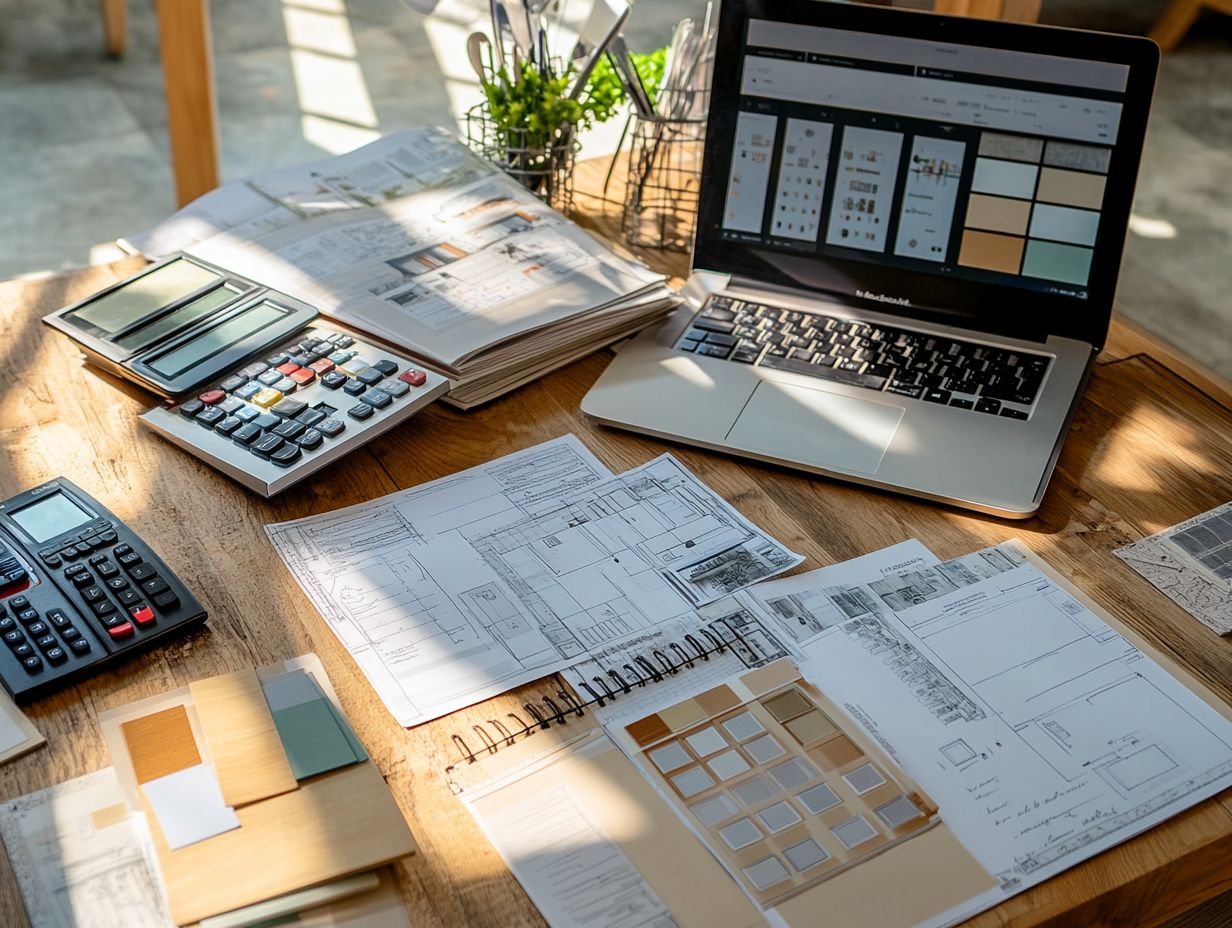
In the ongoing debate between tackling a kitchen remodel yourself or bringing in the professionals, it’s essential to weigh the distinct pros and cons of each option carefully.
If you have a flair for handiwork, you might relish the opportunity to install a backsplash or repaint cabinets. These smaller projects can breathe new life into your kitchen without stretching your budget.
However, if you’re envisioning a complete overhaul or intricate designs, the expertise of a seasoned contractor is invaluable. They possess specialized skills and a comprehensive understanding of local building codes and realistic timelines.
For structural changes or plumbing work, enlisting professionals can significantly reduce the risk of costly mistakes. Meanwhile, DIY enthusiasts may find joy in smaller-scale projects that allow for creativity while minimizing financial investment.
Ultimately, your decision will depend on your experience, the time you can commit, and the scope of your project.
Sticking to Your Budget
Maintaining your budget during a kitchen remodel is crucial for realizing your renovation dreams without incurring financial strain or unforeseen costs.
Thoughtful planning and disciplined cost management enable you to sidestep common pitfalls that frequently result in budget overruns. By setting clear guidelines and diligently tracking your expenses throughout the project, you can adeptly navigate the complexities of remodeling while staying firmly aligned with your financial objectives.
Don’t delay in discussing your budget with your contractor—it’s crucial for staying on track!
Tips for Staying Within Your Budget
To stay within your budget during a kitchen remodel, consider implementing a series of actionable strategies that will guide both your planning and spending.
Begin by crafting a detailed list of all necessary materials and appliances, prioritizing essential items while allowing some flexibility in less critical areas. Regularly review your expenses and maintain clear communication with your contractor to sidestep unexpected costs that could derail your budget.
Establishing a contingency fund—extra money set aside for unexpected costs—is crucial; it’s a good idea to set aside around 10% of your overall budget for unforeseen expenses that might pop up during the renovation.
Utilize budgeting tools or apps to track your spending in real-time, giving you valuable insights into where adjustments can be made. Setting milestones and timelines can significantly enhance efficiency. This makes it easier to monitor both progress and costs.
Cultivating an open dialogue with your contractor is essential. Discuss potential cost-saving alternatives and ensure that both of you remain aligned throughout the project.
Frequently Asked Questions
Curious about planning your kitchen remodel? Here are some common questions many homeowners have:
What should be my first step when planning a kitchen remodel?
The first step when planning a kitchen remodel is to establish a budget. This will help you determine what changes and upgrades are feasible and set realistic expectations for your project.
How do I determine my budget for a kitchen remodel?

Determine your budget by assessing your finances and considering how much you are willing and able to spend on your remodel. Don’t forget to also research the costs of materials and labor in your area.
Yes, there are a few hidden costs to keep in mind when budgeting for a kitchen remodel. These may include permits, unexpected structural issues, and appliance delivery and installation fees.
How can I save money while planning my kitchen remodel?
There are a few ways to save money during a kitchen remodel. You can opt for more affordable materials, consider doing some of the work yourself, or repurpose and refurbish existing items in your kitchen to save on purchasing new ones.
Should I include a contingency budget in my kitchen remodel plan?
It is always a good idea to have a contingency budget when planning a kitchen remodel. This will allow you to cover any unexpected costs or make additional changes to your project without going over your original budget.
What if I go over my budget during the kitchen remodel process?
If you go over your budget during the kitchen remodel process, it is important to reassess your priorities and make cuts or changes where necessary. You may also consider taking out a loan or financing options to cover the additional costs.
Don’t wait! Start budgeting now to make your dream kitchen a reality!
